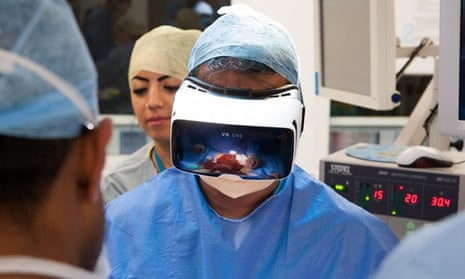An operation on a British cancer patient is to be live-streamed around the world using virtual reality technology designed to make viewers feel as if they are in the operating theatre.
It will be performed by Shafi Ahmed, a London surgeon who has been at the forefront of pioneering virtual reality technology in surgery, and who described next month’s operation as a gamechanger for healthcare innovation and education.
The patient, a British man in his 70s with cancer of the colon, has not been named but was said to be excited about the prospect of having his operation watched internationally.
Viewers will be able to watch the surgery at the Royal London hospital from 1pm on 14 April using a smartphone and virtual reality headset. The operation, which will be filmed by a number of specialist cameras placed above the operating table, is expected to last between two and three hours.
It will run a minute or so behind the surgery in case of any unforeseen complications.
While trainee physicians have traditionally had to settle for looking over the shoulder of a surgeon, the technology will allow users to position themselves anywhere and view the operation from all angles.
Ahmed, a consultant surgeon at St Bartholomew’s hospital, said that the technology would “address the global inequalities in surgical health” and allow trainees and surgeons to connect and train remotely across the world.
“It showcases virtual reality for what it should be used for – education,” he said. “This is a gamechanger and they can see if anything goes wrong how we react to it.”
In 2014, Ahmed removed a tumour from the liver and bowel of a patient in what was the first operation streamed live online using Google Glass.
The procedure to remove cancerous tissue from the liver and bowel of a 78-year-old man was watched live via computer or mobile phone by 13,000 surgical students, healthcare professionals and members of the public in more than 100 countries.
During the operation, medical students were able to type questions so Ahmed could answer them while he carried out the surgery. The low cost of streaming the operation means that trainee surgeons around the world are able to access such information at a much earlier stage in their career than they would otherwise.
Ahmed said “the next step” in three or four years would be to add additional components that would allow surgical users of virtual reality technology to experience touch and feel. “The idea would be to add gloves and interactive technology so that you could actually feel your way around,” he said.
“What we want to do is actually create the virtual surgeon. You could have a patient in virtual reality, be able to pick up a scalpel, make a cut and do a virtual operation first before doing it for real,” Ahmed said.
“It’s also about immersing yourself in the environment and getting used to working with a team around you, what it sounds like around you, and so on. So VR is about so much more than just the wow factor of simply viewing.”
Ahmed said he has been meeting regularly with the patient in the run-up to the operation in April and that the man was enthusiastic about the project. “He is really up for it,” he said. “I’ve gone through things with him and he genuinely is really interested in the project and wants to help.”
Before the 2014 operation, the use of Google Glass technology in surgical teaching had been used only by a small number of medical schools in the US.
Next month’s operation is being streamed in partnership with Medical Realities and the live-streaming service Matavision.
